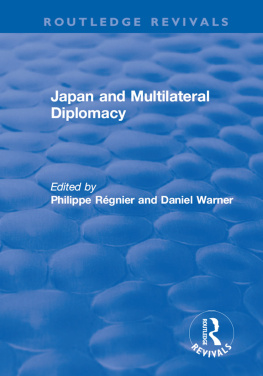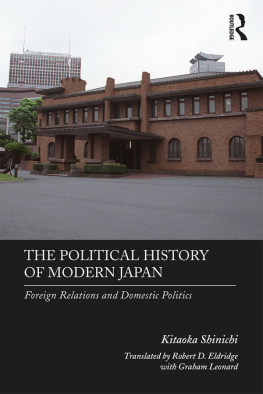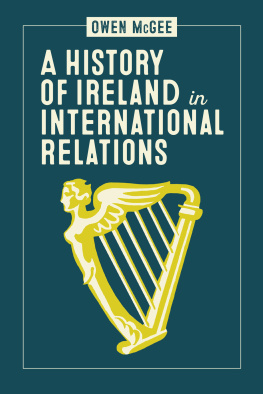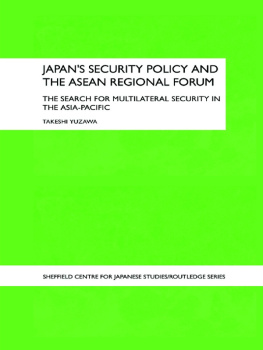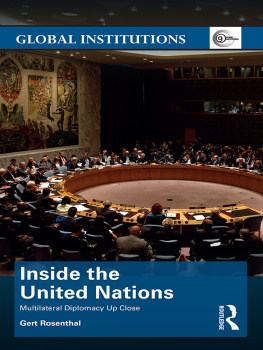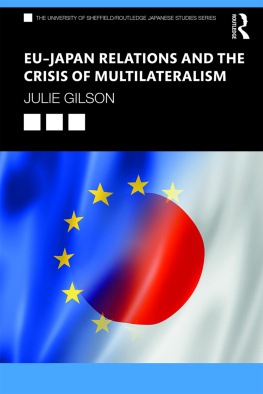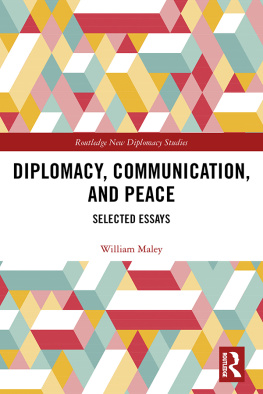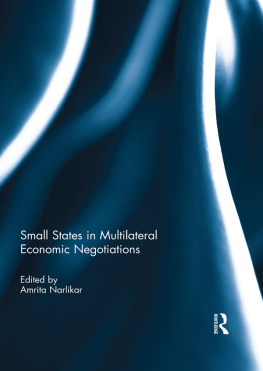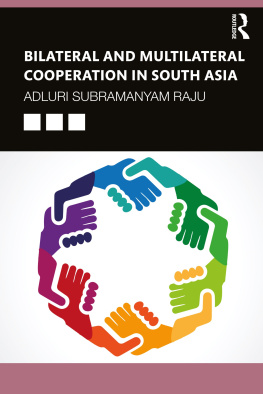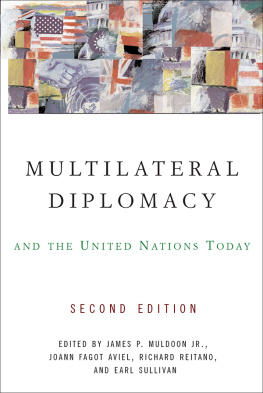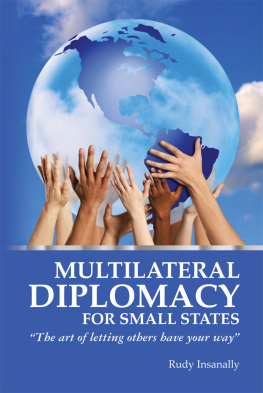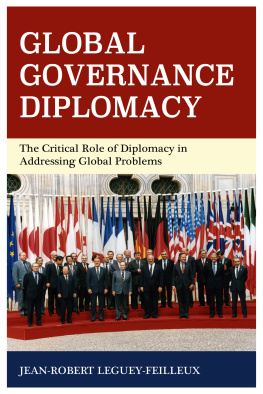JAPAN AND MULTILATERAL DIPLOMACY
Japan and Multilateral Diplomacy
Edited by
PHILIPPE RGNIER and DANIEL WARNER
First published 2001 by Ashgate Publishing
Reissued 2018 by Routledge
2 Park Square, Milton Park, Abingdon, Oxon, 0X14 4RN
711 Third Avenue, New York, NY 10017, USA
Routledge is an imprint of the Taylor & Francis Group, an informa business
Copyright Philippe Rgnier and Daniel Warner 2001
All rights reserved. No part of this book may be reprinted or reproduced or utilised in any form or by any electronic, mechanical, or other means, now known or hereafter invented, including photocopying and recording, or in any information storage or retrieval system, without permission in writing from the publishers.
Notice:
Product or corporate names may be trademarks or registered trademarks, and are used only for identification and explanation without intent to infringe.
Publishers Note
The publisher has gone to great lengths to ensure the quality of this reprint but points out that some imperfections in the original copies may be apparent.
Disclaimer
The publisher has made every effort to trace copyright holders and welcomes correspondence from those they have been unable to contact.
A Library of Congress record exists under LC control number: 00110700
ISBN 13: 978-1-138-70263-9 (hbk)
ISBN 13: 978-1-315-20952-4 (ebk)
Contents
Philippe Rgnier and Daniel Warner
Yoshinobu Yamamoto
Yoshinobu Yamamoto
Keith Krause
Wolfgang Pape
Jean-Pierre Lehmann
Franois Heisbourg
Victor-Yves Ghebali
Fred Tanner
David Sylvan
Tsutomu Kikuchi
Matake Kamiya
Reinhard Drifte
In Memoriam
The publication of this book could never have been possible without the lifetime endeavour of Professor Seizaburo Sato to link Japan with the world scientific community for better mutual understanding of international affairs.
With the constant support of his colleague, Professor Yoshinobu Yamamoto, he was the central figure behind a 199698 joint academic programmme linking the Graduate Institute of Policy Science (Tokyo) and the Graduate Institute of International Studies (Geneva). We had the immense pleasure to welcome him as a visiting scholar at GIIS in 199697 and will ever keep a vibrant memory of both his profile of scientific excellence and his personal convictions and friendship. He was the original source of inspiration of a joint scientific workshop organized in 1998 and from which this book is derived. Professor Y. Yamamoto, who visited us for six months in 199798, also played a crucial role in its conception and implementation.
This book is dedicated to the memory of Professor Seizaburo Sato. His regrettably early death in 1999 has been a great loss to both the Japanese and world communities studying international relations.
We take also this opportunity to thank very warmly Professor Y. Yamamoto for his continued co-operation and friendship, and also to express our enormous gratitude for the generous support of the Japanese Consulate General in Geneva and the Japan Foundation in Tokyo.
The Editors
After the end of the Cold War, multilateral institutions have increased importance both at the global and regional levels and both in the economic and security areas. The United Nations has been playing a crucial role in keeping peace in a still tumultuous world and the World Trade Organization is only one of the global institutions in the economic area which has been strengthened after the Cold War. In the Asia-Pacific region which had been devoid of multilateral institutions during the Cold War, multilateralism has emerged and been developing positively. In 1989 when the Cold War was about to end, the Asia-Pacific Economic Cooperation (APEC) was established and in 1994 the ASEAN Regional Forum started. Now, the Democratic Peoples Republic of Korea (North Korea) joined the ARF, which has increased the value of ARF tremendously. Furthermore, ASEAN countries and the three Northeast Asian Countries (China, Republic of Korea and Japan) have started a new regional co-operation called ASEAN 10+3. East Asian countries including Japan have not intended to exclude Europe in their efforts to create regional institutions and fora. The European Union has been a member of ARF, and ASEM (AsiaEurope Meetings) had its third meeting in Seoul in October 2000.
During the Cold War era, Japan kept exclusive relations with the United States, even though it had put rhetorical emphasis on the United Nations and on Asia. However, Japan has been trying to increase its roles in the United Nations and regional institutions to contribute to continuous international community build-up. Thus, it has become an important matter for Japan to seek the ways which it can participate appropriately in multilateral institutions not only at the governmental level but also through academic networks. Free dialogue among scholars may be considered a productive way to pursue this objective.
The Japan Foundation fully supported the project which brought Japanese and European scholars together to provide them opportunities to exchange their views in Geneva in March 1998. This book is the output of that meeting. In this book, a productive dialogue is presented between Japanese and European scholars regarding multilateralism in general, and Japanese attitudes and policies toward various multilateral institutions in particular.
This conference was part of a larger joint academic co-operation between the Graduate Institute of International Studies in Geneva and the Graduate Institute of Policy Science in Tokyo, which was fully supported by the Japan Foundation. The entire project was intended to enhance mutual understanding between Japan on the one hand and Switzerland and the rest of Europe on the other, through joint research and exchange of scholars. I do think that this kind of project is crucial for Japan and Europe to promote mutual co-operation. I would like to express my greatest appreciation to the Japan Foundation, the Graduate Institute of Policy Science, and of course to the Geneva-based Graduate Institute of International Studies, particularly its Modern Asia Research Center and its Program for the Study of International Organizations.
Finally, I must express my deepest regrets that Professor Seizaburo Sato, who had led the entire project on the Japanese side, died before receiving a copy of this book.
Yoshinobu Yamamoto
Tokyo, 25 November 2000
Reinhard Drifte: Professor at the Chair of Japanese Studies, Department of Politics, University of Newcastle upon Tyne, Newcastle, UK.
Victor-Yves Ghebali: Professor of Political Science, Graduate Institute of International Studies, Geneva, Switzerland.
Franois Heisbourg: Professor, Institut dEtudes Politiques, Paris, France and Chairman, Geneva Centre for Security Policy, Geneva, Switzerland.
Matake Kamiya: Associate Professor of International Relations, National Defense Academy, Yokosuka, Japan.
Tsutomu Kikuchi: Professor, School of International Politics, Economics and Business, Aoyama Gakuin University, Tokyo, Japan.
Keith Krause: Professor of International Politics, Graduate Institute of International Studies, Geneva, Switzerland.
Jean-Pierre Lehmann: Professor of International Political Economy, Institute for Management Development, Lausanne, Switzerland.

